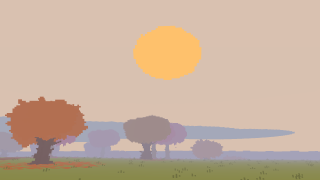"But It's Not A Game"
By gamer_152 20 Comments
Over the past few years an increase in the number of developers experimenting with what games can be and what they can include has lead to us seeing more and more interactive experiences that don’t fit into the traditional box for what we consider games. Recent attention given to titles like Gone Home and The Stanley Parable has prompted a certain portion of the gaming community to try and take those games down a peg or state that they don’t really belong in game discussion spaces by declaring that they’re not actually games.
Scepticism over whether certain “games” really are games isn’t new territory for the medium, management sims and sandbox programs for example have traditionally been known for blurring the definition of the word, but the new generation of maybe-games is less like what we’ve traditionally called games than ever, and while something like Gone Home might once have had to exist as a 2D Flash project or a rudimentary 3D title downloadable only from an obscure developer site, we’re now seeing higher-production, more fully fleshed-out products in this style getting released on respected digital distribution platforms, and receiving the kind of attention from games critics and the gaming community that once would have been reserved exclusively for a narrower set of entertainment experiences. This has inevitably led to the “It’s not a game” discussions becoming more widespread than ever. Sometimes they are valuable discussions, but most of the time they’re unproductive and at least start with a lot of misunderstandings about the topic.
To deal with the easiest part first, even if something is not a game or lacks game-like elements that’s not a valid criticism. I understand that not all people are attempting to use this discussion point to try and demonstrate something negative about certain entertainment, but some people are, and it doesn’t make sense. Sure, game mechanics, challenges, goals, etc. are all things that we know can engage us, but then we also know from mediums like television and music that visuals, sound, and stories are equally capable of entertaining us even without any gameplay alongside them, leaving the idea that a game must be bad if it doesn’t include enough gameplay to be a non-argument. You might as well conclude that movies must be bad because they don’t include game mechanics, or that music is bad because it doesn’t include visuals, or that books are bad because they don’t include sound. From here though, it gets a little more complicated.
To the Dictionary

A lot of us have this vague concept in our head of what makes up a game and we can easily look at something like Thirty Flights of Loving or Dear Esther and claim that they’re not games, even construct arguments why they’re not, but that doesn’t mean a whole lot if we can’t decide what a "game" is to begin with. Laying out a proper definition of that word is something that people have been trying to do since long before the invention of video games, and there is no one definition of "game".
I’d recommend checking out the Definitions section of the Games page on Wikipedia if you’re interested in going further down this route (don’t worry, it’s all properly sourced), but some common criteria included in definitions of games are that they must have rules, have goals, have metrics of success, be participated in for enjoyment, include play, be non-productive, have conflict, or include competition. Obviously, this is a pretty nebulous term that can mean a lot of different things to a lot of different people, and you’ll find that even some entertainment that is already widely accepted as constituting a game may not fit these boxes. For example, we might call Portal or Lumines games, but they don’t really contain any competition. Spec Ops: The Line is a game, but it often tries to make itself deliberately unenjoyable. Some people play competitive games to make money, while puzzle games like Phylo help organisations in the real world with academic problems. This would seem to disqualify both of these types of games as non-productive, and yet we would still think of them as games. Then you have the fact that the definition of “Play” gets just about as ambiguous as the definition of "game". This can go on for a while.
"Game" being such an amorphous blob usually isn’t a problem and all these competing definitions don’t mean that we can’t use the word "game" or have solid, formal definitions to refer to in discussions, but there are a few implications of the lack of a single, concrete "game" concept that we should keep in mind. Firstly and most importantly, it means that challenging whether something is a game is more of a semantic argument than the meaningful assessment of the work’s contents than it often seems to be taken as. Secondly, it means you can’t just show up to places and start telling people they’re wrong for calling something a game that you wouldn’t necessarily call a game, or demonstrate that one product isn’t actually a game, and expect it to be taken as gospel. With so many varied definitions out there, that’s just not going to fly. But okay, let’s say that we looked at it and agreed that Gone Home, Dear Esther, The Stanley Parable, and all these other contested “games” don’t qualify as games, or only partially qualify as games. Even if that was the case I still don’t think referring to them as games would necessarily be a bad idea.
Usually It Doesn’t Matter
There’s not a widely-accepted name or categorisation for these supposed non-games apart from “games”. In fact even in this blog post I’ve struggled with what to call them. If these things aren’t part of the medium we call games, then what medium or mediums are they a part of? What name do we use to refer to them? We need a term or terms for products like these that is universally understood, easily repeatable, and doesn’t sound clunky. In the past interactive experiences that don’t constitute games have been called “interactive fiction”, “sandboxes”, “puzzles”, “toys”, “programs”, or just “experiences”, and some of these identifiers fit okay, but many of them have issues, many apply to only a small number of things we need to label, you can’t just force words on people, and "game" still remains one of the best terms we have for referring to these things. Everyone immediately knows what you mean by "the game", it’s a widely accepted term, it’s sharp, it fits smoothly into a sentence, and to be honest there’s only so many times you can talk about “the experience” before you need another word. Regardless of whether you feel that SimCity or Dys4ia are games, referring to them as games is often a matter of practicality or necessity.

However, even if the word is useful, it still doesn’t make sense to cover what aren’t games in places dedicated to games, right? I mean we don’t do this with other mediums, and for good reason. Film publications wouldn’t just start putting out restaurant reviews, and book websites would have to make a pretty huge exception to start discussing the latest Gears of War. So if hypothetically what we have aren’t games, why should we place them alongside actual games? Well for one thing, there’s far more crossover between these hypothetical non-games and games than there is between, for example, movies and books. Okay, the non-games may lack explicit goals or challenges or whatever else, but they’re still computer programs with the purpose of acting as art or entertainment that make use of formal interaction mechanics. Some also have more “gamey” elements like scoring, resource management, interactive storytelling, and so on. The people who discuss, play, and make games already have an interest in entertainment that includes the aforementioned things, a rather specific one that wouldn’t really be supported by the enthusiasts of anything else out there, and for that reason it makes sense for games enthusiasts to discuss these kinds of works, and game creators to work on projects like these. The fact that these experiences are sold in games stores like Steam also feeds into and off of their relevance to people who play games.
If we don’t run things like this, what’s the alternative? If these supposed non-games are still to be recognised they’d have to be either picked up by some other media community like music or television fans/creators which we know would never happen and would only be a worse fit than what we have now, or there’d have to be a rising community of retailers, critics, and sites dedicated solely to the Depression Quests and Proteuses of the world, which again, is unrealistic and downright crazy. Even if the kind of experiences we’re talking about are not games, when we treat them as games it means people can share, enjoy, and criticise these works that would otherwise go ignored. But then for some that’s the point, isn’t it?
Exclusivity
I believe that a certain portion of this “It’s not a game” discussion has come from a genuine attempt at being constructive, but we all know much of it has been an effort to try and invalidate games that don’t conform to certain individuals’ personal tastes. At one point people started trying to establish an in-group elitism among members of the gaming community by arguing that certain people were “Real gamers” or “True gamers”, while others weren’t, and now the same kind of people are trying to establish elitism in our entertainment by declaring what are and are not “Real games”. We can see discussion after discussion where some people believe they can use “It’s not a game” as a loophole dismissal of whatever games they don’t like in place of actual constructive criticism. But of course that doesn’t work.
The “Is this a game?” debates are a bit like the “Are games art?” debates. Important in the right context, but some of the time they’re just about people trying to elevate the games they like to a higher level, and even when the debates are sincerely conducted, they often break down because people don’t define what they mean, and are left unaware that they’re arguing semantics. Usually when “Is this a game?” is a relevant question, what it’s really being used to determine is whether something is valid in the space it’s being presented in and what the qualities of it are, but these are questions we can ask and think about directly, and I believe that’s often more productive than getting bogged down in the ambiguity and multitudinous definitions of the word "game". Thanks for reading.